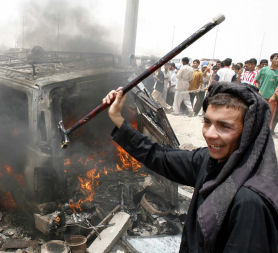Post-war violence was 'not predicted'
Updated on 29 January 2010
The former prime minister Tony Blair has told the Chilcot inquiry that he failed to predict the role al-Qaida and Iran would play in fomenting violence after the invasion of Iraq.

Mr Blair said there had been extensive planning for the aftermath of the war, but the emphasis had been wrong.
He said: "The real problem is that our focus was on the issues that in the end were not the issues that caused us the difficulty. People didn't think that al-Qaida and Iran would play the role that they did. It was really the external elements of al-Qaida and Iran that really caused this mission very nearly to fail."
The former prime minister said it was not lack of money that was causing problems for the coalition, "it was a lack of security".
More Channel 4 News coverage of Tony Blair at Iraq war inquiry
- Blair: Resolution 'gave green light'
- Blair to Chilcot: I believed Saddam had WMDs
- Blair: no secret deal with Bush
- Blair: Iraq policy changed after 2001
- Iraq inquiry: day by day
He added: "I don't think I refused a request for money or for equipment at any point in the time that I was prime minister.
"And my view, very strongly, is that when you are asking your armed forces to go into this situation, you put everything to one side other than making sure they have the equipment they need and they have the finances there to back it up."
Mr Blair said it had not been foreseen that al-Qaida would move into Iraq and "people did not believe Iran ... would try to deliberately destabilise the country" by supporting insurgents.
Mr Blair said it had been made clear to the Iranians that US troops were not going to invade their country, but that did not stop them from becoming "a major destabilising factor".
Asked if assessments had been carried out beforehand, he said that while it was assumed "you might get elements of the (Iranian) Revolutionary Guard playing around", the feeling was that Tehran would be relieved to see the back of Saddam Hussein.
Turning to what would have happened if Saddam had been left in place, he said: "I have little doubt myself, but it's a judgment and other people may take a different judgement, that today we would be facing a situation where Iraq was competing with Iran, competing both on nuclear weapons capability and competing more importantly perhaps than anything else, competing as well as the nuclear issue in respect of support of terrorist groups."





